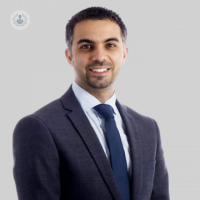How exactly is testicular cancer diagnosed?
Written in association with:We recently spoke to highly revered consultant urological surgeon, Mr Ahmed Ali, to find out what the main warning signs of testicular cancer are, whether or not it is curable, and what exact steps are involved in the diagnosis.

What are the main warning signs to look out for in relation to testicular cancer?
Testicular cancer is a very rare form of cancer. It mainly occurs in men between the ages of 20 and 50 years old. Usually, the main sign is finding a lump in one testis, incidentally, during examination.
Occasionally, men also present with pain or general discomfort in their testis, a feeling of heaviness, and sometimes noticing certain changes in the scrotum. These are certainly all warning signs of testicular cancer.
How exactly is testicular cancer diagnosed?
So, most men actually know when they could have testicular cancer. The majority of men feel the lump, and once they find it, they will present this to their doctor, who will then undertake an examination, and hereafter refer them accordingly.
Once they come to see a specialist, a series of blood tests will be carried out, including tumour markers, that are very helpful in the diagnosis. We also perform a very urgent ultrasound scan to either make an accurate diagnosis, or rule out testicular cancer. Occasionally, we might send the patient for a CT scan, just to check if they don’t have any secondary effects.
What are the main causes and risk factors?
There are no real causes of testicular cancer, but there are plenty of risk factors. The main risk factor is what we called undescended testis. This occurs when the testis does not descend during birth.
Other risk factors include exposure to radiotherapy and chemicals, but usually, it is undescended testis that is the main cause that we look for.
When should surgery be considered?
When it comes to testicular cancer, surgery is the main cure, and is considered in nearly all testicular cancer cases. In an extreme minority of patients, where they present with severe metastatic testicular cancer (where the cancer has spread to other organs and is causing life-threatening symptoms), chemotherapy will be the first course of action for these particular patients.
Is testicular cancer curable?
Luckily, testicular cancer is a very curable condition. More than 95 per cent of men with the cancer will be clear within a timeframe of five years. Even in the highest risk/latest stage scenario, the cure rate is 60 per cent, thanks to chemotherapy agents being used.
Mr Ahmed Ali can certainly guide you in the right direction when it comes to ruling out or diagnosing testicular cancer, and can offer the most suitable treatment option for this. Consult with him today if you are worried about any symptoms that could potentially be related to testicular cancer by visiting his Top Doctors profile.


